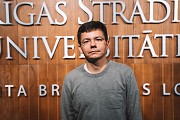Authors
Janis Juzefovičs1; 1 Riga Stradins University, LatviaDiscussion
The paper presents results of a small-scale qualitative audience research project into the ways audiences in two Baltic countries, Latvia and Estonia, both bordering Russia and having a sizeable Russophone minority, keen users of Russian-origin news providers, experience and make sense of media at the times of geopolitical tension and uncertainty. The study takes a holistic, non-media-centric approach to the study of media trust. It argues that to fully grasp the complexities of the ways people experience, think, and feel about the media, we have to understand how people experience and make sense of wider social and political worlds. We know from the rich body of research into the interplay of media trust and political trust in the Baltics (Juzefovičs 2017, 2022, 2023), other post-communist societies (Pjesivac 2017; Pjesivac, Spasovska, and Imre 2016, 2017) and elsewhere (Ariely 2015; Hanitzsch et al. 2018) that there exists a close connection between media distrust and a deficit of trust in political institutions. Similarly, recent inquiries into the ways audiences approach the media have evidenced the link between low media (and political) trust and low social trust (Andersen et al., 2021) and demonstrated how feelings of insecurity, suspicion, and discontent feed into distrust in the media and political elites (Thorbjørnsrud & Figenschou’s 2022). These findings clearly demonstrate the importance of the study of the broader sociocultural and political forces shaping people’s experiences with and attitudes towards the media. Combining essay writing and qualitative interview methods, the study explores the interplay between folk theories of journalism, defined by Nielsen as ‘actually existing popular beliefs about what journalism is, what it does, and what it should do [..] that people use to make sense of journalism’ (2016:840), shared by audiences in Latvia and Estonia and the broader narratives they tell about their own lives, society and politics, and the impact it has on the formation of popular sentiments of media scepticism, defined as feelings of distrust toward the mainstream news media as a whole rather than a particular media organisation (Tsfati 2003; Tsfati and Cappella 2003), and responses of these audiences to disinformation. The study sample involves 15 informants in each country, members of both the ethnolinguistic majority and the Russophone minority, selected with the help of a purposeful sampling technique to reflect the sociodemographic diversity of Latvian and Estonian society. Essay texts submitted by study participants, as well as interview data, have been thematically coded following the tradition of a constructivist grounded theory approach. 

